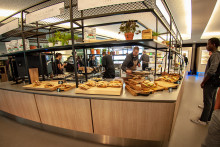The academic Computer Science research in the Netherlands is good, often very good and in some cases even excellent; however, it is fragmented, according to an inspection by an international committee of top researchers.
The inspection by QANU (Quality Assurance Netherlands Universities) involved eight universities: Eindhoven, Nijmegen, Maastricht, Amsterdam, Utrecht, Groningen and Twente and the Vrije Universiteit.
On the UT, the inspection committee visited the Center for Telematics and Information Technology (CTIT), where Computer Science research is done in various groups. The judges were pleased with the institute. `The institute is ambitiously working to acquire a leading role in Dutch research and is under dynamic management. […] CTIT is strong in certain areas and has a clear international reputation.' As a critical remark, the committee noted that the UT is in a constant process of reorganization. The administrative overload will have to be decreased. The committee identifies another weakness in the staff's lack of knowledge on research regulations and their lack of involvement in the decision process. The various CTIT research groups earned grades varying from satisfactory to excellent.
The committee points to the traditionally good cooperation between Computer Science and Mathematics and Logic as the source of Dutch academic success. It also sees an increase of applied research, such as the development of Information Systems. There is also increased attention to interdisciplinary matters, such as Bio-Computer Science.
The judges are also pleased about the improved financial possibilities, such as the doubling of the subsidies by research financer NOW, and the availability of special funds. Dutch researchers are mostly `very motivated and dedicated.' The committee speaks of `impressive groups who are competitive on an international level.'
According to QANU, applied research should also be developed at universities with a theoretical background in order to encourage innovation in industry. A known problem is the `dramatically' reducing number of Dutch Computer Science students, which threatens the future of the Dutch knowledge economy. The increasing number of foreign students is not a solution, because they often return to their own country. Thus, the committee vaguely urges the Computer Science programs to `reinvent themselves' to become more attractive.
Trans. Jeroen Latour







